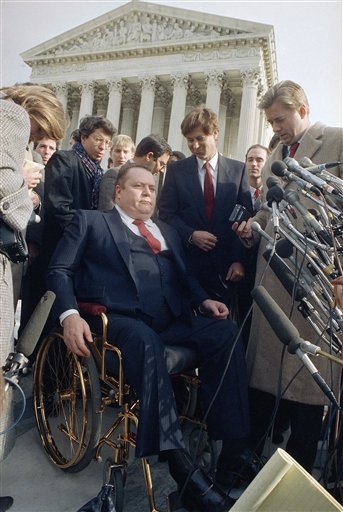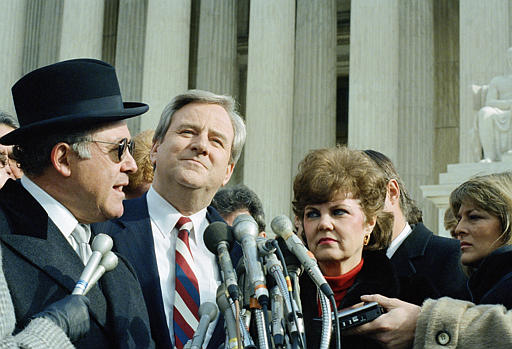In Hustler Magazine v. Falwell, 485 U.S. 46 (1988), the Supreme Court reversed a lower court’s judgment for intentional infliction of emotional distress against a publisher, noting that the First Amendment protects publishers’ free speech and press rights from such claims made by public figures regarding materials that are clearly labeled as parodies. The celebrated Court decision pitted two icons of 1980s politics — pornographer Larry Flynt and religious leader Jerry Falwell — against one another in a contest over tort liability and the First Amendment. Flynt was the publisher of Hustler magazine, a sexually explicit men’s magazine. Falwell was the founder of a conservative Christian group, the Moral Majority, and Liberty University in Lynchburg, Virginia.
Inside the front cover of its November 1983 issue, Hustler published what it characterized as a “parody.” It was a take-off on a national advertising campaign promoting Campari, an Italian liqueur. Campari ads featured various celebrities talking about their “first time,” a deliberate double entendre. Feigning a real Campari ad, Hustler’s parody contains a photograph of Jerry Falwell and an interview with him about his “first time” — a drunken incestuous encounter with his mother in an outhouse. At the bottom of the page was the disclaimer:“ad parody — not to be taken seriously.” Further, the magazine’s table of contents lists the ad as “Fiction; Ad and Personality Parody.”
Falwell sues in response to ad falsity
Falwell sued Flynt to recover damages for libel, invasion of privacy, and intentional infliction of emotional distress. The U.S. District Court for the Western District of Virginia granted a directed verdict for Hustler on Falwell’s invasion of privacy claim. On the libel claim, the jury found against Falwell, concluding that the Hustler parody could not “reasonably be understood as describing actual facts about [Falwell] or actual events in which [he] participated.” However, the jury ruled for Falwell on the intentional infliction of emotional distress claim. The United States Court of Appeals for the Fourth Circuit affirmed this latter judgment, dismissing as “irrelevant” the jury finding that the Hustler parody did not describe actual facts; the appeals court viewed the issue as “whether [the parody’s] publication was sufficiently outrageous to constitute intentional infliction of emotional distress.”

Sex magazine publisher Larry Flynt leaves the Supreme Court building in Washington, Dec. 3, 1987 after their court case was heard. The Supreme Court justices, whose ruling is expected by July, must decide the validity of a $200,000 award won by Rev. Jerry Falwell for an advertising parody that appeared in Flynt’s Hustler magazine. (AP Photo/Charles Tasnadi)
Actual malice not applicable for public figures
The Supreme Court reversed the Fourth Circuit’s judgment. Chief Justice William H. Rehnquist wrote for a unanimous Court (Justice Anthony M. Kennedy did not participate, having joined the Court after this case was argued). The core of the Court’s decision is that, under the “actual malice rule” of New York Times Co. v. Sullivan (1964), the First Amendment protects publishers from claims for damages for intentional infliction of emotional distress made by public figures.
Rehnquist, a collector of political cartoons, wrote that although Falwell considered the cartoon to be outrageous, “‘[o]utrageousness’ in the area of political and social discourse has an inherent subjectiveness about it which would allow a jury to impose liability on the basis of the jurors’ tastes or views, or … their dislike of a particular expression. An ‘outrageousness’ standard thus runs afoul of our long-standing refusal to allow damages to be awarded because the speech in question may have an adverse emotional impact on the audience.”
“They wanted me to pay Reverend Falwell $200,000 because I hurt his feelings,” Flynt told Speaking Freely interviewer Ken Paulson in 2003. “My attorney says, ‘Pay it,’ because [Falwell] was suing me for $50 million. He said it will cost you $2 million to take it to the Supreme Court. I said, ‘Well, that’s where we’re going,’ and we lost in the Fourth Circuit. It wasn’t looking very good then, and no one thought that the Supreme Court would ever grant cert, and they did. And their decision was unanimous. I remember Justice Rehnquist’s words even so clearly today:”.
If he had lost, the impact on the press would have been dramatic, Flynt said.
“Well, what happens to the press is that means no public figure would ever have to prove libel,” Flynt said. “All he would have to do is go into a court and prove you hurt his feelings. Whether it’s a political cartoonist or an editorial writer or what have you, you know. The press would have been virtually doomed. And I don’t think it was the Supreme Court siding with me over Reverend Falwell. I think that they were looking at the practical implications of the decision if they [had] ruled the other way.”
This article was originally published in 2009. James C. Foster is Professor Emeritus of Political Science at Oregon State University-Cascades.

